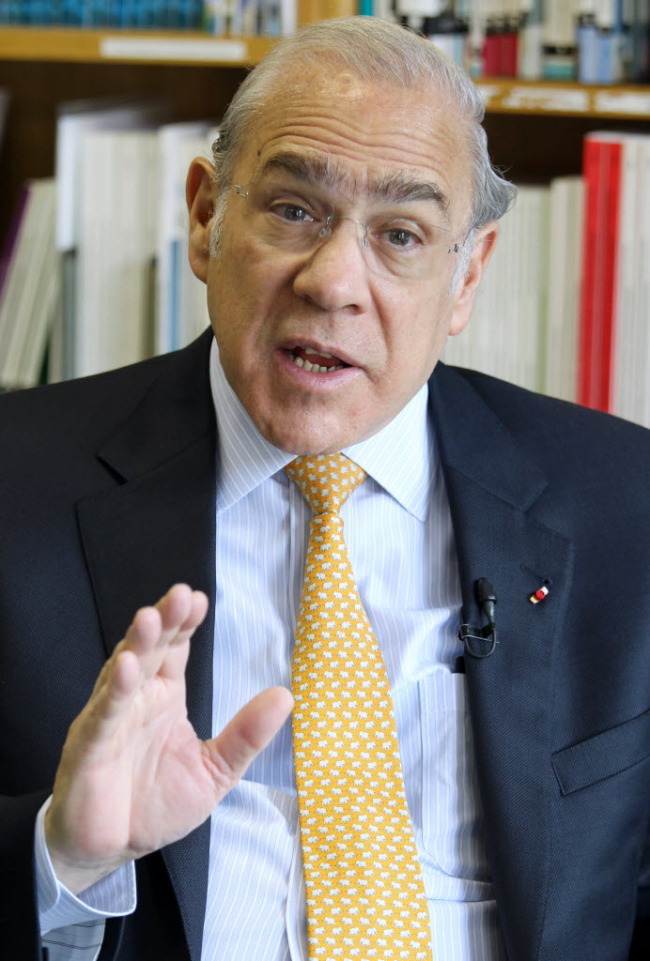PARIS (AFP) ― People with the highest incomes in advanced countries have grown disproportionately richer despite the recent financial crisis and should pay their fair share of the tax burden, the OECD said on Wednesday.
The lowest wage earners have scarcely progressed and some may even have fallen behind in real terms in the last 30 years, the Organization for Economic Cooperation and Development said.
The gap will widen without policy action on the way tax systems work, it said, probing facts, trends and causes of a perpetually hot subject in political debate which took centre stage as governments ramped up taxes to cope with a banking crisis, and then in Europe with a debt crisis.
The richest 1 percent of wage earners had captured a “disproportionate” share of overall income growth in the last three decades, it said.
In the United States the real incomes of the top one-in-a-hundred people had grown by 47 percent and in Canada by 37 percent.
Noting that in the last 30 years, top income tax rates had fallen markedly in most OECD countries, the organization suggested that death duties, or inheritance tax, could feature among measures to correct the imbalance.
The 34-member OECD grouping advanced democracies is known for providing hard-hitting policy advice recommending competition and open markets as the key to rising prosperity and welfare for all.
It’s mission slogan is “Better policies for better lives.”
Commenting on new analysis on how the top one percent of income earners have shot ahead in good times and held onto gains in bad times, OECD Secretary General Angel Gurria said: “Without concerted policy action, the gap between the rich and poor is likely to grow even wider in the years ahead.”
The lowest wage earners have scarcely progressed and some may even have fallen behind in real terms in the last 30 years, the Organization for Economic Cooperation and Development said.
The gap will widen without policy action on the way tax systems work, it said, probing facts, trends and causes of a perpetually hot subject in political debate which took centre stage as governments ramped up taxes to cope with a banking crisis, and then in Europe with a debt crisis.
The richest 1 percent of wage earners had captured a “disproportionate” share of overall income growth in the last three decades, it said.
In the United States the real incomes of the top one-in-a-hundred people had grown by 47 percent and in Canada by 37 percent.
Noting that in the last 30 years, top income tax rates had fallen markedly in most OECD countries, the organization suggested that death duties, or inheritance tax, could feature among measures to correct the imbalance.
The 34-member OECD grouping advanced democracies is known for providing hard-hitting policy advice recommending competition and open markets as the key to rising prosperity and welfare for all.
It’s mission slogan is “Better policies for better lives.”
Commenting on new analysis on how the top one percent of income earners have shot ahead in good times and held onto gains in bad times, OECD Secretary General Angel Gurria said: “Without concerted policy action, the gap between the rich and poor is likely to grow even wider in the years ahead.”

He said: “Therefore, it is all the more important to ensure that top earners contribute their fair share of taxes.”
The analysis concluded: “Even in countries which have a history of more equal income distribution, such as Finland, Norway and Sweden, the share of the top 1 percent increased by 70 percent, reaching around 7-8 percent.
“By contrast, top earners saw their share grow much less in some of the continental European countries, including France, the Netherlands and Spain.”
The poorest households had not kept pace with the overall growth of incomes and many were no better off than they were in the mid 1980s.
The recent financial crises had temporarily halted the trend but top income earners had held onto their gains.
“On average, real incomes of the top 1 percent increased by 4 percent in 2010, while the lowest 90 percent of the population saw their real incomes stagnate.”
In the last 30 years most OECD countries had cut tax rates for top incomes, on average from a rate of 66 percent to 43 percent in 2013, and this had been tracked by a rise in the share of wealth taken by top incomes.
Other taxes affecting top incomes had also fallen. The average baseline rate of tax on companies had fallen by nearly half from 47 percent to 25 percent and taxes on local dividend payments from 75 percent to 42 percent.
The analysis suggested various reforms to ensure that top income earners made a fairer contribution to shouldering the tax burden.
Among these were: abolishing or reducing tax advantages; taxing all forms of income, fringe benefits and stock options as ordinary income; weighting taxation towards “immovable property”; and reviewing wealth taxes such as inheritance tax.
The OECD also suggested international cooperation on tax rules to discourage high earners from organizing their affairs to benefit from different rules, so-called “treaty shopping.”
It also pressed for further progress on efforts led by the OECD to fight cross-border tax evasion.
-
Articles by Korea Herald




![[Herald Interview] 'Amid aging population, Korea to invite more young professionals from overseas'](http://res.heraldm.com/phpwas/restmb_idxmake.php?idx=644&simg=/content/image/2024/04/24/20240424050844_0.jpg&u=20240424200058)













![[KH Explains] Korean shipbuilding stocks rally: Real growth or bubble?](http://res.heraldm.com/phpwas/restmb_idxmake.php?idx=652&simg=/content/image/2024/04/25/20240425050656_0.jpg&u=)

